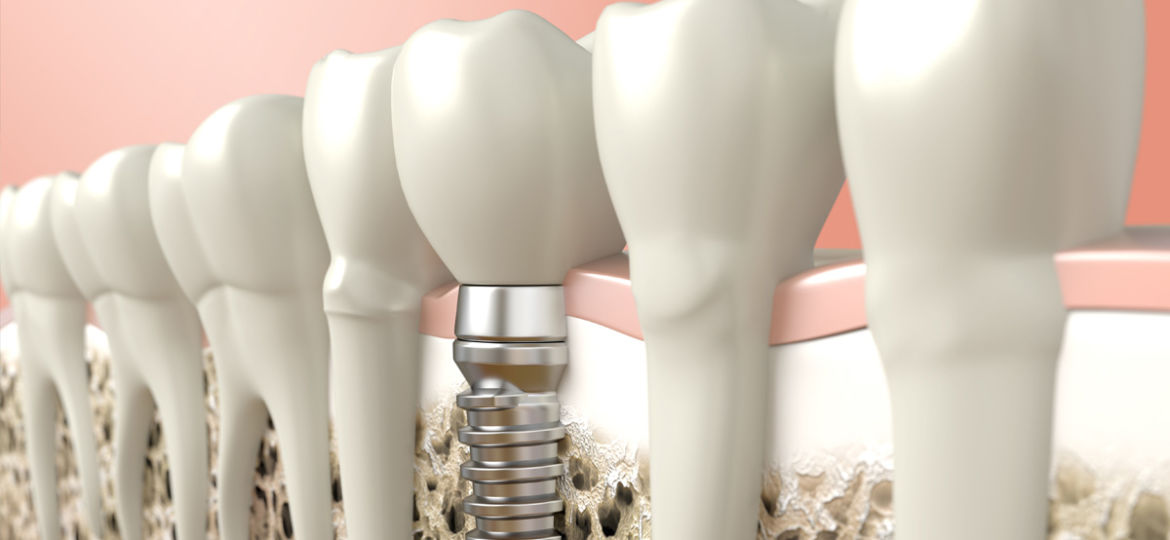
A smile is a person’s unique signature to the world. Nothing can replace it. So when disease or an accident occurs resulting in tooth loss, it can be devastating. Fortunately, with today’s advancement in dentistry, many options exist to patients who need surgery and restoration. Dental implants are an option for those with missing teeth, for those uncomfortable or unsatisfied with their dentures or bridgework, or for those who simply wish to maintain the stable structure of their surrounding teeth with the added bonus of a confident and natural-looking smile.
According to the ADA (American Dental Association), 5.5 million implants are placed by dentists annually. Implants are strong, light metal posts made of titanium, surgically placed in the lower or upper jaw serving as an anchor for the replacement tooth. Made of biologically compatible materials, implants effectively fuse with the surrounding bone to offer the durable support needed for synthetic teeth. Unlike dentures, partials or bridgework, implants don’t slip when chewing or speaking. A dental implant also protects and preserves the bone surrounding the missing tooth and secures a perfect fit that looks more natural than dentures. With good oral hygiene, implants can last a lifetime.
Selecting the Right Implant Dentist
Not only can selecting the right dentist for your dental implant make a difference in the outcome of your treatment, it can also affect your surrounding teeth, gum tissue and jaw bone if an implant proves unsuccessful. It’s highly recommended that you research implant dentists before beginning treatment. Here are some factors to consider as you determine which implant dentist is a good fit for you.
- What expertise or training qualifies the dentist to preform dental implant procedures? How long has the dentist been placing implants, and how many are placed each year? Confirm whether the dentist has considerable experience with implant treatments. At your consultation, be sure to ask questions about studies they’ve participated in or the training they’ve received. Regardless of the dentist’s professional background, be sure to check with the state dental board for issues.
- Ask about before and after photos of implant procedures they have performed. Also ask if they track the success rate of their dental implants?
- Does the implant dentist provide more than one service in the treatment plan? Does the dentist also provide cosmetic restoration? Some dentists perform both the implant surgical placement and the cosmetic restoration, including the design and placement of the crown or bridgework that fits on top of the implant itself for a natural custom fit.
- What implant system will the dentist be using? Implant technology evolves at a rapid pace, so it pays to investigate the implant treatments available. Some of these technologies come with a warranty. Always ask if the dental surgeon guarantees their work.
- Who is a good candidate for dental implants, and how long will the entire process take from consult to crown placement? Ideal patients are non-smokers and have no current chronic conditions. Dental patients should have excellent oral hygiene, healthy gums and sufficient jaw bone structure for adequate implant post support. For this reason, a dentist will perform an exam of the implant site. They may also take x-rays or CAT scans, and sometimes molds are taken to assess your bite.
- What philosophy does your dentist have about implants? Be sure to ask about the alternatives, risks and benefits to dental implants. The dentist should listen to your preferences regarding your tooth loss, and offer optional treatments. With implants, there is a 97% success rate compared with the success rate of bridges. But with bridges adjacent teeth are shaved or smooth down, putting their healthy stable structure at risk. Approximately 75% of all bridges will need replacement.
Remember to research the answers provided and follow up if you need further clarification. Also don’t be afraid to ask the dentist or dental surgeon to take you through the entire process step by step so there are no surprises. If your goal is a natural smile without pain or discomfort, consider dental implants as an alternative to bridges and dentures that will last a lifetime.

